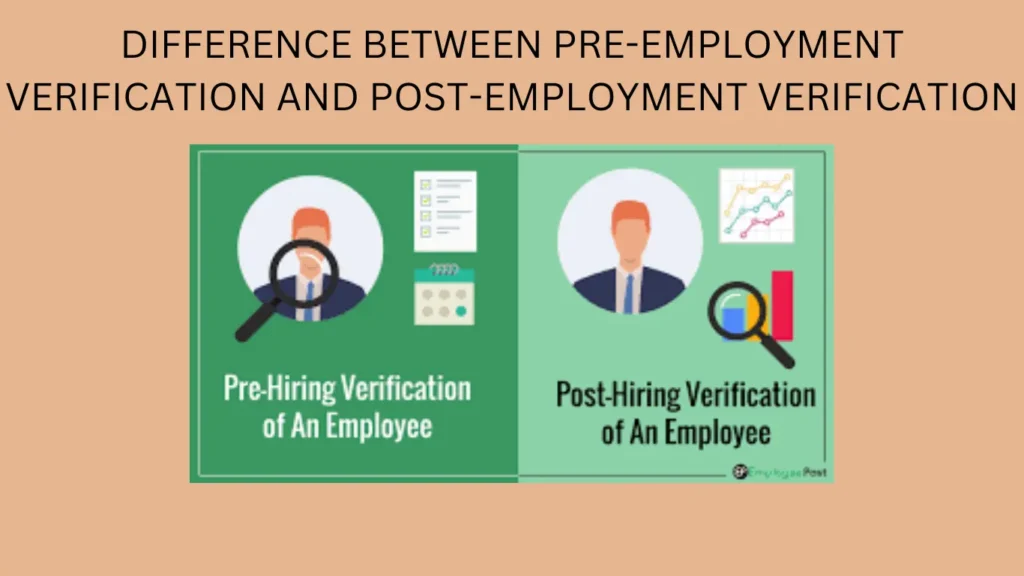To avoid suffering enormous losses in the form of worse organizational morale, worse productivity, and increased turnover costs, we must be completely certain about the people we hire. According to a poll by the Professional Background Screening Association (PBSA), 73% of businesses had a formal screening policy in place, while 94% of firms performed at least one kind of background check. Employee background checks are done both before and after they are hired by a company, either during the onboarding process or after they are recruited. A thorough background check service is necessary to make sure that the candidates are reputable and do not pose any risk to the company’s standing. The expeditious verification of an employee’s statements on their employment application is known as a one-time pre-employment check. A conditional job offer that depends on the final background check report being “green” (background check reports are color coordinated), or validated, may be part of the post-employment verification process. This provides a detailed portrait of the person.
Certain organizations are in a haste to fill in some significant positions and therefore, they take in individuals without fully confirming their credentials. Usually, the Human Resource Manager does the personnel checks and an easy approach to have it done is by going over the Identity documents and some academic certifications. These documents are not examined in the thorough method that accredited background check business employ. By performing checks directly from the issuing authorities via automated platforms, a reliable background verification company like Millow will not only expedite the fraud mitigation process overall, but it will also produce accurate reports quickly. It’s not impossible to make educated employment judgments now that we have more information.
Pre-employment and post-employment verification differ primarily in that while pre-employment checks focus solely on potential candidates who have applied for a job, post-employment checks cover all employees of the firm and are therefore all-encompassing. This means that if you make a bad hire, not only will your clients suffer, but your employees as well. An element of unprofessionalism in a firm can result in declines in work quality, employee disengagement, and interdepartmental conflicts.
While post-employment checks are performed after an individual begins work and can even be done continuously (either annually or semi-annually), pre-employment checks are conducted during the recruitment phase.While post-employment checks can take up to seven or nine days, pre-employment checks typically take three to four days.
The primary rationale for placing more focus on post-employment checks is the possibility that a candidate with a clean image may not maintain it for the rest of their life. The majority of scams are started by seasoned workers in top positions inside an organization.
According to a Griffiths and Associates employment screening study, 7% of all employees who had started their careers with a clean record later obtained criminal convictions without their employer’s knowledge. Concerns should be raised regarding substance usage among staff. They turn to drugs in an attempt to hit their targets since they are under pressure to fulfill rigid deadlines. They act without hesitation, and the addiction takes hold in a couple of days. This is particularly true for blue-collar workers, who might require ongoing screening for any indications of illegal conduct.
Other offenses that could lead to an employee’s termination include sexual harassment, revelation of corporate trade secrets, domestic abuse, and physical aggression against coworkers. The stakeholders need to be protected from all of these warning signs. These apply to job screening both before and after, as it varies depending on the individual.
Choosing the best background check company to perform screenings need to be your first focus. The task must be delegated to an organization with the necessary experience, knowledge, and track record.
For further Inquires Contact Us
FAQs
Q: What is the difference between pre-employment verification and post-employment verification?
- A: Pre-employment verification occurs before hiring and includes checks for qualifications, criminal records, and references. Post-employment verification occurs after hiring and may involve ongoing monitoring or additional checks.
Q: What is the purpose of pre-employment verification?
- A: Pre-employment verification helps employers verify the accuracy of information provided by candidates, assess their suitability for a role, and mitigate risks associated with hiring.
Q: How does post-employment verification differ from pre-employment verification?
- A: Post-employment verification is conducted after hiring and may include periodic background checks, drug tests, or checks for professional licenses. It focuses on maintaining workplace safety, trust, and compliance.
Q: Are there any legal considerations for pre-employment and post-employment verification?
- A: Yes, employers must comply with relevant laws and regulations, such as the Fair Credit Reporting Act (FCRA), which outlines requirements for conducting background checks and obtaining employee consent.
Q: How do pre-employment and post-employment verification processes benefit employers?
- A: These processes help employers make informed hiring decisions, reduce turnover rates, maintain workplace safety, and protect their reputation.
